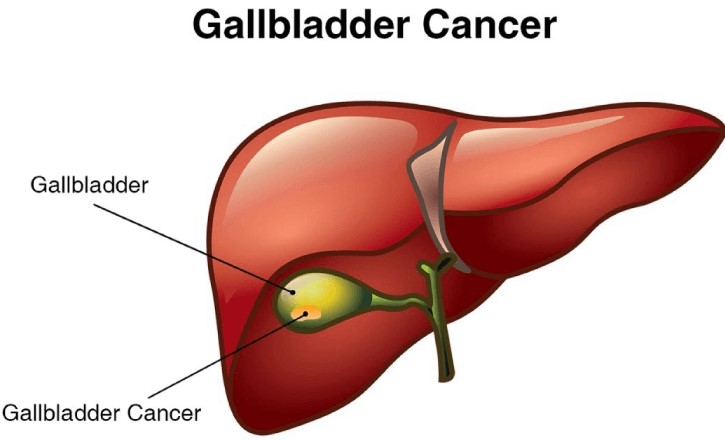Introduction:
Welcome to our comprehensive guide on gallbladder cancer (GB cancer). In this resource, we’ll delve into the intricacies of this relatively rare but serious condition, covering everything from its causes and symptoms to diagnosis, treatment options, and supportive care. Whether you’re a patient, caregiver, or simply seeking knowledge about GB cancer, we’re here to provide you with the information and support you need.

Understanding Gallbladder Cancer:
- Overview: Gallbladder cancer is a type of cancer that begins in the gallbladder, a small organ located beneath the liver. It typically starts in the innermost layer of the gallbladder and can spread to nearby organs or lymph nodes.
- Types: Gallbladder cancer is classified based on the type of cells where it originates. The most common type is adenocarcinoma, which accounts for the majority of cases. Other, less common types include squamous cell carcinoma and adenosquamous carcinoma.
- Risk Factors: Several factors may increase the risk of developing gallbladder cancer, including:
- Gallstones: Long-standing gallstones can increase the risk of developing gallbladder cancer.
- Chronic Inflammation: Conditions such as chronic gallbladder inflammation (cholecystitis) or chronic infection with certain parasites may elevate the risk.
- Age and Gender: Gallbladder cancer is more common in older adults and tends to affect women more frequently than men.
- Ethnicity: Individuals of certain ethnic backgrounds, including Native Americans and Hispanics, have a higher incidence of gallbladder cancer.
- Pathogenesis: Discuss the mechanisms by which gallbladder cancer develops, including the progression from benign conditions such as gallstones or chronic inflammation to malignant transformation.
Signs and Symptoms:
- Early Symptoms: Gallbladder cancer often presents with nonspecific symptoms in its early stages, which may include abdominal pain, nausea, vomiting, and jaundice.
- Advanced Symptoms: As the cancer progresses, additional symptoms may manifest, such as unexplained weight loss, abdominal mass or swelling, and changes in bowel habits.
Diagnosis:
- Imaging Tests: Describe the imaging modalities used to diagnose gallbladder cancer, including ultrasound, CT scan, MRI, and PET scan.
- Biopsy: Explain the role of biopsy in confirming the diagnosis of gallbladder cancer, typically performed through endoscopic ultrasound (EUS) or percutaneous biopsy.
Treatment Options:
- Surgery: Detail the surgical options for gallbladder cancer, such as cholecystectomy (removal of the gallbladder), extended cholecystectomy, or liver resection in cases of advanced disease.
- Chemotherapy: Discuss the role of chemotherapy in treating gallbladder cancer, either as neoadjuvant therapy before surgery or as adjuvant therapy after surgery.
- Radiation Therapy: Explain how radiation therapy may be used to target and shrink tumors in the gallbladder or surrounding tissues.
Supportive Care and Coping Strategies:
- Pain Management: Provide information on managing pain associated with gallbladder cancer through medication, relaxation techniques, and other supportive measures.
- Nutritional Support: Offer dietary guidance and nutritional recommendations to help patients maintain adequate nutrition and manage treatment-related side effects.
- Emotional Support: Address the emotional challenges faced by patients and caregivers, and highlight the importance of seeking support from counselors, support groups, or online communities.
Prognosis and Follow-Up:
- Prognostic Factors: Discuss factors that may influence the prognosis of gallbladder cancer, such as the stage of the disease, tumor size, and presence of metastasis.
- Follow-Up Care: Emphasize the importance of regular follow-up appointments with healthcare providers for ongoing monitoring and surveillance, even after completing treatment.
Conclusion:
Gallbladder cancer is a complex and challenging condition, but with early detection, appropriate treatment, and supportive care, patients can navigate this journey with resilience and hope. Our website serves as a valuable resource for individuals affected by gallbladder cancer, offering comprehensive information, practical guidance, and a supportive community to help them on their path to healing and recovery. Together, we can raise awareness, foster empowerment, and inspire hope in the fight against gallbladder cancer.
